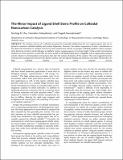Minor Impact of Ligand Shell Steric Profile on Colloidal Nanocarbon Catalysis
Author(s)
Chu, Sterling B; Fukushima, Tomohiro; Surendranath, Yogesh
DownloadCarbonColloids_Manuscript_ChemMater_revisions_Final.pdf (2.893Mb)
PUBLISHER_POLICY
Publisher Policy
Article is made available in accordance with the publisher's policy and may be subject to US copyright law. Please refer to the publisher's site for terms of use.
Terms of use
Metadata
Show full item recordAbstract
The catalytic activity of a colloidal nanoparticle is typically inhibited by the very capping agents that are required to maintain colloidal stability and catalyst dispersion. However, the relative importance of steric contributions to the observed attenuation in catalytic activity is poorly understood. Herein, we prepare colloidal graphitic carbon nanoparticles featuring covalent amide linkages to aliphatic surface capping agents of varying length. Using aerobic benzylamine oxidation as a test reaction, we find that the steric profile of the ligand shell plays a negligible role in suppressing catalytic activity relative to chemisorption interactions that alter the surface chemistry of the catalyst. The work suggests that heterostructured nanoparticles that provide distinct surface sites for ligand binding and substrate activation should allow for high colloidal stability and robust catalytic activity
Date issued
2017-01Department
Massachusetts Institute of Technology. Department of ChemistryJournal
Chemistry of Materials
Publisher
American Chemical Society (ACS)
Citation
Chu, Sterling B., et al. “Minor Impact of Ligand Shell Steric Profile on Colloidal Nanocarbon Catalysis.” Chemistry of Materials, vol. 29, no. 2, Jan. 2017, pp. 495–98. © 2017 American Chemical Society
Version: Author's final manuscript
ISSN
0897-4756
1520-5002